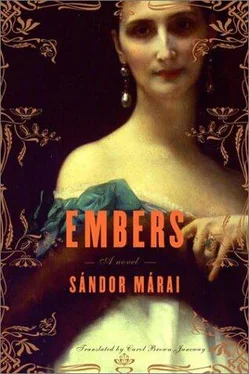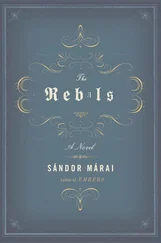The “difference” that Henrik’s father had mentioned when the Countess and Konrad were playing the Polonaise-Fantaisie gave the latter a power over the soul of his friend.
Of what did this consist? Every exercise of power incorporates a faint, almost imperceptible, element of contempt for those over whom the power is exercised. One can only dominate another human soul if one knows, understands, and with the utmost tact despises the person one is subjugating. As time went on, the nightly conversations in Hietzing took on the tone of conversations between master and pupil. Like all those compelled by inclination and external circumstances to premature solitude, Konrad’s tone as he spoke of the world was gently ironic, gently disdainful, and yet in some involuntary fashion full of curiosity, as if the events that presumably took place over there on the other side were of interest only to children and those even less experienced than they. But his voice betrayed a certain homesickness: youth always yearns for that terrifying, suspect, indifferent homeland known as the world. And when Konrad amicably, jokingly, casually, condescendingly teased the son of the Officer of the Guards about his adventures in that world, one could hear in his voice the need of a thirsty man yearning to drain life dry.
They lived in this fashion in the flickering dazzle of youth, fulfilling a role that was also a profession, and that gave their lives both a sense of real tension and of inner stability. Sometimes it was a woman’s hand that knocked gently, with sweet excitement, on the door of the apartment in Hietzing. One day the hand belonged to Veronika, the dancer-the memory of this name makes the General rub his eyes as if he had just been jolted awake out of a deep sleep with shreds of dreams still lingering in his head. Yes, Veronika. And then Angela, the young widow of the medical officer, who was obsessed with horse-racing. No, rather, Veronika, the dancer. She lived in the attic apartment of an ancient house in Three-Horseshoe Lane; it was a single large studio, and impossible to heat properly. But it was the only place she could live, given the space she required for her exercises and steps.
The echoing room was decorated with dusty bouquets of dried flowers and animal portraits done by a painter from Steiermark who had left them for the in lieu of rent. Sheep had been his favorite subject, and it was gloomy sheep with damp, vacant, questioning eyes that stared at the visitor from all corners of the room. Veronika lived in all this while surrounded by dust-laden curtains and worn-out furniture.
As one came up the stairs, one could already smell the strong scents she wore, attar of roses and French perfumes. One summer evening, all three of them went out to dinner together. The General remembers it well, as if he were inspecting a painting with a magnifying glass. It was in a little country tavern in the woods near Vienna. They had ridden out there in a carriage through the fragrant trees. The dancer wore a wide-brimmed hat of Florentine straw, white elbow-length crocheted gloves, a tight-fitting dress of rose silk, and black silk shoes. Even her bad taste was perfect. She teetered uncertainly across the gravel under the trees as if every footstep taken on bare ground in the direction of the tavern were unworthy of her. As one would preserve a Stradivarius from having to play mere drinking songs, she preserved the masterpieces that were her legs, dedicated as they were to the art of the dance and the suspension of earth’s gravity, from the tragic limitations of the body.
They ate in the courtyard of the simple tavern overgrown with wild vines by the light of candles set in glass shades. They drank a light red wine and the young woman laughed a great deal. On the way home, as they crested a hill and looked down at the city shimmering in the moonlight, Veronika spontaneously threw her arms around their necks. It was a moment of pure happiness, pure being. Silently they accompanied the dancer to her door and kissed her hand in farewell. Veronika. And Angela with her horses. And all the others, with flowers in their hair, circling past in a dance, scattering blossoms, notes, ribbons, and long gloves in their wake. These women had brought the intoxication of love’s first adventures into their lives, and with it all its companions: desire, jealousy, and the struggle with loneliness. And yet, beyond their roles and their lives in society, beyond the women, something else, something more powerful made itself felt. A feeling known only to men. A feeling called friendship.
The General dressed himself without summoning his servant. He took his dress uniform out of the wardrobe and gazed at it for a long time. It had been decades since he had worn it. He opened a drawer, took out his decorations, and lifted them from their boxes lined in red, white, and green silk. As he held the medals of bronze, silver, and gold in his hand and ran his fingers over them, he saw in his mind’s eye a bridge-head over the Dnieper, or a parade in Vienna, or a reception in Buda’s royal palace. He shrugged. What had life brought him? Duties and idle pleasures. Like a card player absentmindedly gathering up his chips after a big game, he let the decorations slide back into the drawer.
He dressed in black, tied his tie of white pique, and ran a wet brush through his white, close-cropped hair. In the last years these austere, almost priestly clothes had become his uniform. He went to his desk, fumbled in his portfolio with trembling old fingers for a tiny key, and unlocked a long, deep drawer. From its secret compartment he removed a number of different objects: a Belgian revolver, a little packet of letters tied with blue ribbon, and a book bound in yellow velvet with the word “souvenir” imprinted on the cover. The book was also closed with a blue ribbon and the knot had been stamped with a seal. The General held it in his hand for a long time. Then he checked the weapon with expert attention. It was an old revolver with six chambers. All six had bullets in them. With a casual flick of the wrist he dropped the revolver back into the drawer, and shrugged again, then slipped the yellow-velvet-bound book deep into the pocket of his jacket.
He stepped to the windows and opened the shutters. While he had been asleep there had been a sudden cloudburst. A cool breeze was moving between the plane trees, and the wet leaves glistened as if they had been oiled. It was already dusk. He stood motionless at the window, arms crossed over his chest, looking out at the landscape, the valley, the forest, the yellow road far below, the distant outline of the town. His farsighted eyes picked up the movement of a steadily advancing carriage.-.His guest was enroute.
Face expressionless, body motionless, he followed the rapidly moving target. Then he closed one eye as a hunter does when taking aim.
It was already past seven o’clock when the General came out of his bedroom. Leaning on his ivory-headed cane, he walked with slow, measured steps down the long corridor that linked this wing of the castle, with its private quarters, to the great public rooms, the reception hall, the music room, the salons. The walls of the corridor were hung with old portraits in gold frames: portraits of ancestors, of great-grandfathers and great-grandmothers, of friends, of former servants, of regimental comrades and famous guests. It was a tradition in the General’s family to employ a resident artist: sometimes itinerant painters, but sometimes also better-known men, such as the artist from Prague who had spent eight years here during the General’s grandfather’s time and had painted everyone who came within range of his brushes, including the majordomo and the winning racehorses. His great-grandfather and great-grandmother had fallen victim to the attentions of amateur artists indulging their wanderlust, and stared down from the wall in their robes of state. They were followed by a number of serious, composed male figures-contemporaries of the Officer of the Guards, with Hungarian moustaches and curled forelocks, wearing black formal clothes or dress uniforms. It had been a good generation, the General thought, as he looked at the portraits of his father’s relatives, friends, and military comrades. A good generation, a trifle eccentric, not at ease in society, arrogant, but absolutely dedicated to honor, to the male virtues: silence, solitude, the inviolability of one’s word, and women. If they were let down, they remained silent. Most of them were silent for a lifetime, bound to duty and discretion as if by vows. Toward the far end of the corridor were the French portraits, French ladies with powdered hair, fat bewigged gentlemen with sensual lips, distant relations of his mother, unknown faces looming dimly out of their backgrounds of blue, pink, and dove gray. Then the picture of his father in his Guards’
Читать дальше












